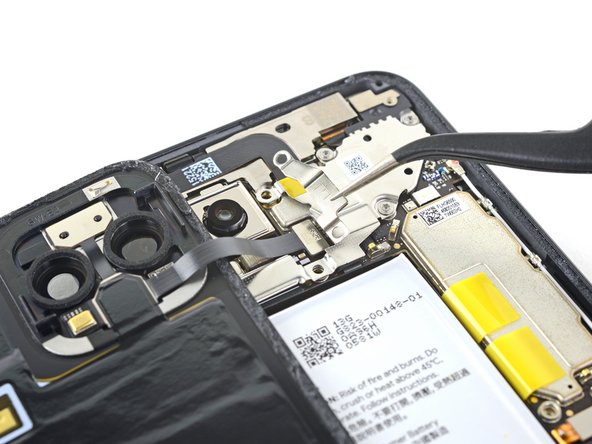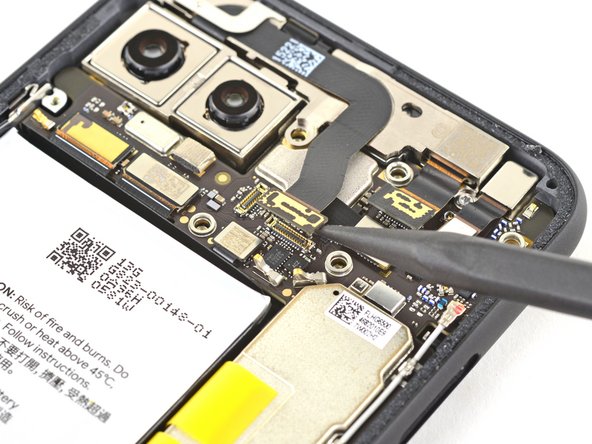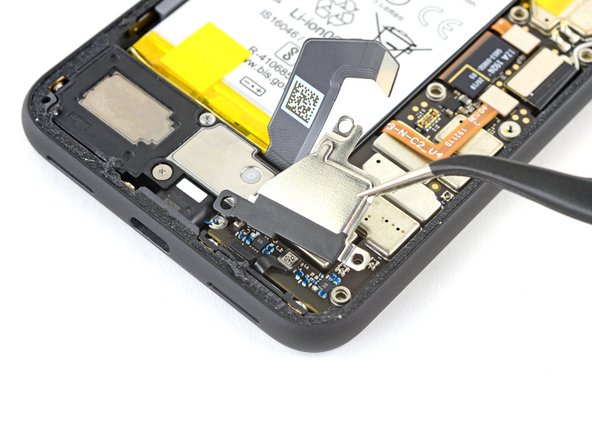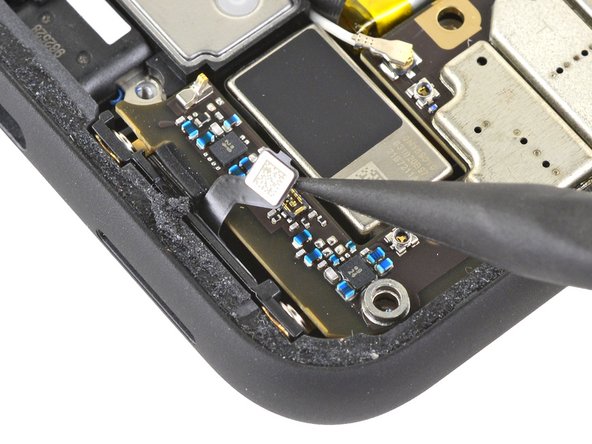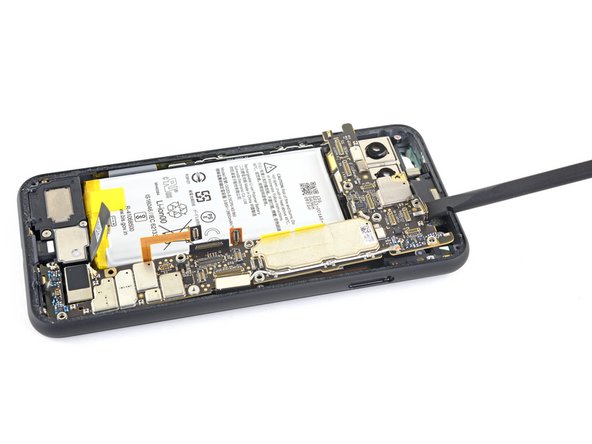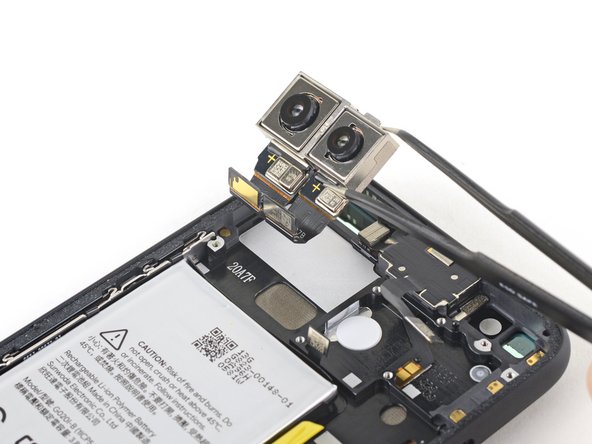Google Pixel 4 Rear Camera Module Replacement
ID: 136193
Description: This repair guide was authored by the iFixit...
Steps:
- Insert a SIM eject tool, bit, or a straightened paper clip into the small hole on the SIM card tray on the left edge of the phone.
- Press firmly to eject the tray.
- Remove the SIM card tray.
- Prepare an iOpener and apply it to the bottom edge of the back panel for one minute.
- A hair dryer, heat gun, or hot plate may also be used, but be careful not to overheat the phone—the display and internal battery are both susceptible to heat damage.
- Apply a suction cup to the heated edge of the back panel by pressing down on it to create suction, as close to the edge as possible.
- If your back glass is badly cracked, covering it with a layer of clear packing tape may allow the suction cup to adhere. Alternatively, very strong tape may be used instead of the suction cup. If all else fails, you can superglue the suction cup to the broken panel.
- Pull up on the suction cup with strong, steady force to create a gap between the back panel and the frame.
- Depending on the age of your phone, this may be difficult. If you are having trouble, apply more heat to the edge and try again.
- Insert the point of an opening pick into the gap.
- Slide the opening pick across the bottom towards the left corner to slice the adhesive.
- With the pick still inserted, slide it from the bottom left corner over to the bottom right corner to completely slice the bottom side adhesive.
- Leave the pick inserted in the bottom right corner to prevent the adhesive from re-sealing.
- Prepare an iOpener and apply it on the left edge of the phone for one minute.
- Insert a second opening pick underneath the back panel directly over the charge port.
- Slide the opening pick to the bottom left corner of the phone.
- Slide the opening pick around the bottom left corner and across the left side of the phone to slice the adhesive.
- The adhesive can be very gummy. Push the pick in and out in a sawing motion to help with slicing.
- Stop when you reach the top left corner, near the camera, and leave the pick inserted.
- Prepare an iOpener and apply it on the right edge of the phone for one minute.
- With the first two opening picks still in place, insert a third pick on the lower part of the righthand side.
- Slide the opening pick up towards the top of the phone, slicing the right side's adhesive.
- Stop when you reach the top right corner, and leave the pick inserted.
- Slide the third opening pick around the top right corner and across the top side of the phone, slicing the final strip of adhesive.
- Once you have sliced around the perimeter of the phone, carefully lift the right edge of the back cover, opening it like a book.
- Do not try to pull the panel all the way off yet, as it is still connected to the phone.
- Continue swinging open the back panel until you can rest it on the left edge the phone, being careful not to put any stress on the attached ribbon cable.
- During reassembly, this is a good point to power on your phone and test all functions before re-sealing the back panel. Be sure to power your phone back down completely before you continue working.
- Remove the five T3 Torx screws securing the battery connector shield:
- Four 4.0 mm screws
- One 2.1 mm screw
- Throughout this repair, keep track of each screw and make sure it goes back exactly where it came from.
- Use a pair of tweezers to remove the battery connector shield.
- Whenever you use the spudger near the battery, be very careful not to puncture the battery.
- Using the pointed end of a spudger, pry the battery connector straight up from the motherboard to disconnect the battery.
- To re-attach press connectors like this one, carefully align and press down on one side until it clicks into place, then repeat on the other side. Do not press down on the middle. If the connector is misaligned, the pins can bend, causing permanent damage.
- Using the flat end of a spudger, gently fold the battery cable over so it doesn't accidentally make contact during the rest of your repairs.
- Use a T3 Torx driver to remove the two 4 mm screws securing the back panel connector cover.
- Use a pair of tweezers to remove the back panel connector cover.
- Using the pointed end of a spudger, pry up and disconnect the back panel connector.
- Remove the back panel.
- During reassembly, follow this guide to install custom-cut adhesives for your device.
- Follow this guide if you are using a pre-cut adhesive card.
- Use a T3 Torx driver to remove the four 4 mm screws securing the camera connector cover.
- Using a pair of tweezers, tilt the camera cover up and slide it out of the retaining slot on the upper right corner of the phone to remove.
- Using the pointed end of a spudger, pry the camera and sensor connectors straight up from the motherboard.
- Disconnect the laser module connector.
- Use a T3 Torx driver to remove the two 2.4 mm screws securing the front camera and sensor assembly.
- Use a pair of tweezers to remove the front camera and sensor assembly.
- Remove the two T3 Torx screws securing the vibration motor shield:
- One 4.2 mm screw
- One 4.4 mm shouldered screw
- Use a pair of tweezers to remove the vibration motor shield.
- Use the pointed end of a spudger to disconnect the two rear-facing camera connectors from the motherboard.
- Disconnect the side buttons connector from the motherboard.
- Disconnect the earpiece speaker connector from the motherboard.
- Disconnect the left grip sensor connector from the motherboard.
- Disconnect the charge port connector from the motherboard.
- Disconnect the display connector from the motherboard.
- Disconnect the right grip sensor connector from the motherboard.
- Use a pair of tweezers to grip the metal clip and pull the connector straight up off of the motherboard
- You can also a spudger and pry up gently to unclip the bottom antenna connector from the motherboard.
- Disconnect the bottom microphone connector from the motherboard.
- Gently pry back—but don't remove—the two battery adhesive pull tabs lightly adhered to the motherboard.
- Using a spudger, pivot the top end of the motherboard up and out of the phone's frame.
- Slowly lift out the motherboard, being careful not to snag any ribbon cable connectors.
- The rear-facing camera module connectors loop around the motherboard, and the camera module is not secured to the phone, so it may lift out with the motherboard during this step.
- Completely remove the motherboard.
- When removing the motherboard, the small rubber bottom microphone cover may fall off. Don't lose it.
- When reinstalling the motherboard, check that no ribbon cable connectors are caught underneath.
- Use a pair of tweezers to remove the rear-facing camera module.




































